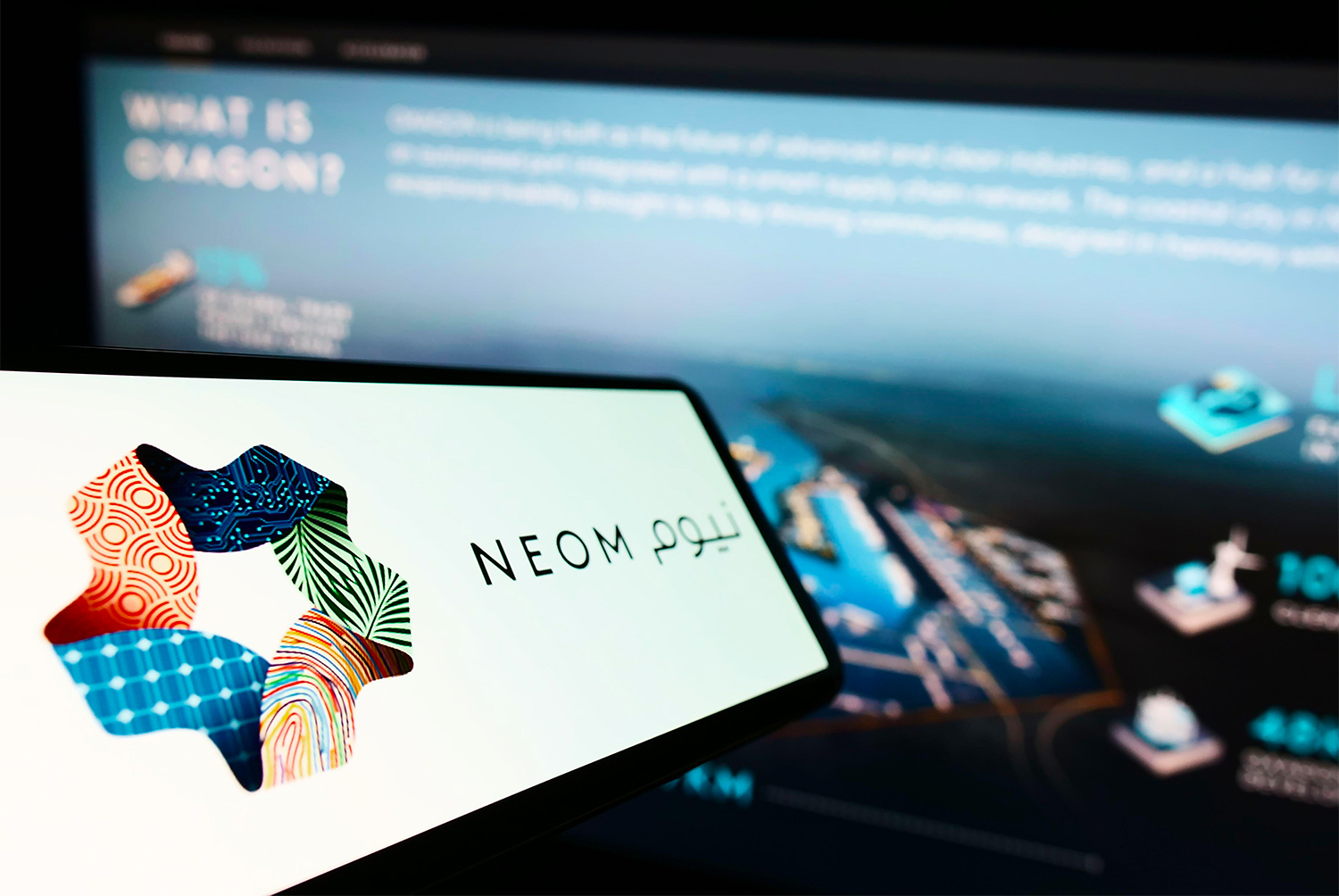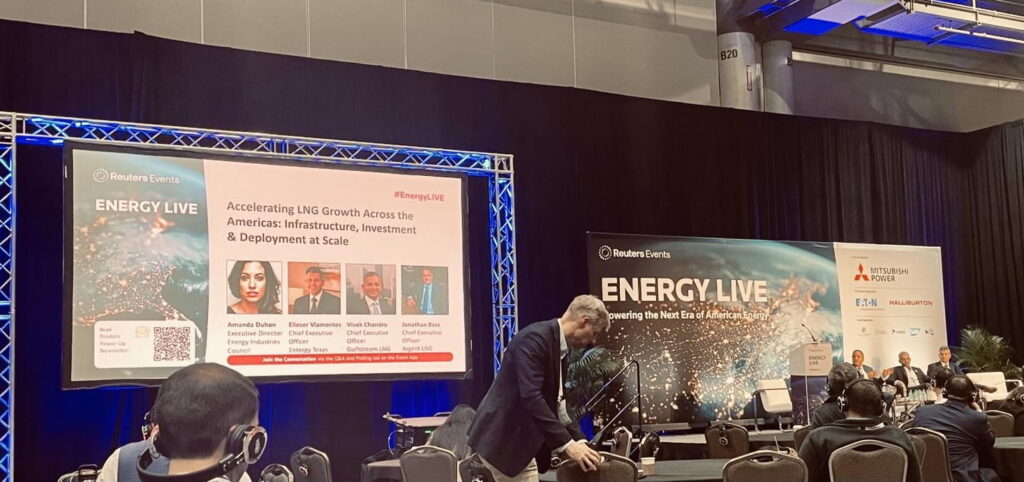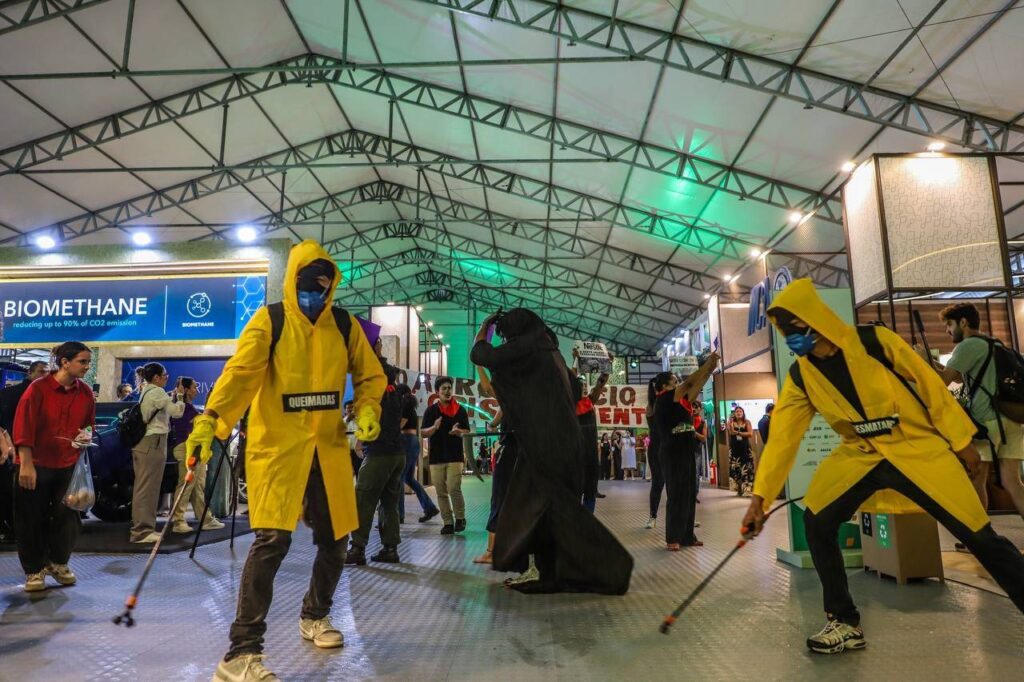Neom was launched in 2017 with a whirlwind of promises. The 26,500 square-kilometre “futuristic” giga project is the brainchild of Saudi Arabia, a fossil fuel state that has pitched Neom as a “revolution in civilisation”.
Neom’s crown jewel, The Line, is a linear city that the kingdom claims will be serviced by high-speed trains and flying taxis.
Despite reports of a significant scale-back to The Line announced this spring, Neom officials claim the project will eventually be delivered in full, starting with Neom’s first destination, Sindalah – a harbour for luxury yachts – due to launch in December.
Unveiled in 2017 by Saudi Crown Prince Mohamed bin Salman (MBS), Neom is part of “Vision 2030” – his plan to modernise the kingdom and diversify its economy beyond fossil fuels. The country possesses 17 percent of the world’s petroleum reserves, and oil accounts for roughly 40 percent of its economic output.
Budgeted at $1.5 trillion and set to be developed in Saudi Arabia’s western Tabuk province, Neom is steered by Saudi Arabia’s Public Investment Fund (PIF), a sovereign wealth fund fattened by oil money.
For decades, Saudi Arabia’s diplomats have obstructed climate action during international climate talks. The kingdom almost derailed the 2015 Paris Agreement by rejecting, until the last moment, calls to set a collective goal to keep global warming under 1.5C. Five years later, at COP26 in Glasgow, Saudi officials tried to cull anti-fossil fuel language from the final text.
However, through Neom, the kingdom has been attempting to embrace a new image – positioning Saudi Arabia as a green champion thanks to massive investments in “new” technologies.
These technologies – which include hydrogen power and carbon capture – have in fact been promoted by fossil fuel giants for decades in a bid to prolong the lifespan of their otherwise stranded hydrocarbon assets.
Despite the disputed nature of these technologies, Saudi Arabia’s vast cash reserves have acted as a honeypot for international lobbyists, governments, and major corporations – all of which are fuelling the kingdom’s attempt to cultivate false climate solutions. This includes the UK government, which has lobbied for the involvement of British companies in Neom – warmly embracing Saudi investment opportunities, regardless of the consequences for the planet.
A Laboratory of False Solutions
Since Neom’s launch, experts have questioned how a project set to house more than nine million people – built from scratch from the proceeds of oil and gas – could meet its extravagant sustainability goals: being carbon-neutral, running entirely on renewables, and preserving nature.
Glitzy adverts on the company’s website provide few answers. Dotted with AI-generated images of futuristic buildings, infinity pools, artificial lakes, and garden walls, Neom’s website provides virtually no indication of how it will desalinate the water needed to supply a new city in the desert, generate enough artificial snow for skiing competitions, or electricity to feed an industrial port.
Neom’s marketing instead relies on vague statements about the deployment of “new technologies and solutions in transportation, energy efficiency, and carbon reduction”. Newsletters promote the company’s pilot projects in the field of carbon capture and storage (CCS), hydrogen, and artificial intelligence, suggesting these are its preferred climate pathways.
“Neom is investing in the technologies of tomorrow – including artificial intelligence – to accelerate societal progress and revolutionise the way we live and work,” the company states in one of its newsletters on LinkedIn. “Did you know Neom is home to the world’s largest utility scale, commercially-based hydrogen facility?”, it says in another.
It is possible to produce ‘green’ hydrogen using solar and wind, which is widely seen as an important way to decarbonise some heavy industries. However, 95 percent of hydrogen currently produced across the world is derived from fossil fuels. In other words, fossil fuel firms have a vested interest in developing a reliance on hydrogen because it will prolong the demand for their products and infrastructure.
“Whether you’re talking about CCS or hydrogen or offsetting – all of those are part of the same category of technologies that companies are hiding behind to slow down any real progress that we could make in terms of climate action,” Myriam Douo, senior campaigner on false solutions at Oil Change International, told DeSmog.
“Techno-fixes are presented as the way forward, when all they do is prolong the life of the fossil fuel industry and derail any kind of appetite for change,” Douo added.
Subscribe to our newsletter
Stay up to date with DeSmog news and alerts
Although they are depicted as new solutions, the technologies backed by Riyadh have been around for years and have failed to work at scale.
In 2019, the kingdom initiated its Circular Carbon Economy (CCE) framework, which promotes CCS as a way to reduce emissions. The importance of CCS to Saudi Arabia’s climate narrative is also reflected by its nationally determined contribution (NDC) – its official climate action plan. Over recent years, Riyadh has been organising and sponsoring international conferences on CCS and investing in research programs to develop the technology.
CCS in theory works by capturing carbon dioxide from industrial sites before the gas is released into the atmosphere. But, as DeSmog has shown, most large-scale CCS projects underperform or fail to meet their capture targets. As the November 2023 UN-backed Production Gap Report pointed out: “the track record for CCS has been very poor to date, with around 80 percent of pilot projects over the last 30 years ending in failure.”
However, like hydrogen, CCS is popular among fossil fuel firms because it offers a way for them to carry on business as usual, rather than transitioning to renewables.
As a result, Neom is at the forefront of Saudi Arabia’s attempt to promote its version of the green transition – one that doesn’t involve the immediate and drastic phase out of fossil fuels.
This is perhaps unsurprising, given the kingdom’s central role in the oil and gas industry.
Saudi Arabia’s oil supermajor, Aramco, is estimated to be responsible for over 4 percent of global greenhouse gas emissions since 1965, making it the world’s largest corporate greenhouse gas emitter. Defying the international climate science community, the company’s CEO Amin Nasser recently called on nations to “abandon the fantasy” of phasing out fossil fuels, adding that the transition to renewable energy is “visibly failing”.
As stated by the world’s foremost climate science body, the UN’s Intergovernmental Panel on Climate Change (IPCC), unabated fossil fuels must be phased out as quickly as possible in order to limit global warming to 1.5C.
This is the view reflected by Myriam Douo. “The real solutions are reducing emissions, dismantling the fossil fuel industry, and changing our energy and economic systems.”
A Global Project
Even so, Saudi Arabia has found a lot of friends in its attempt to cultivate alternative climate solutions.
In recent months, various European governments have played an increasingly active role in connecting industry leaders to Neom.
Leading the pack has been the UK, which has been actively trying to embed British companies in Saudi Arabia’s Vision 2030 project.
This was in full view in October 2023, when Neom launched its European office in London.
The figurative ribbon was cut by Oliver Dowden, who at the time was serving as the deputy UK prime minister. He stood beaming in photos alongside the CEO of Neom, Nadhmi Al-Nasr, and the Saudi Ambassador to the UK, Prince Khalid bin Bandar bin Sultan bin Abdulaziz.
“This is an important milestone,” Dowden said, “integrating Neom with London’s finance and tech ecosystems, with the potential for London to become Neom’s second home for design and project management, promoting investment and growth across the UK.”
A few months later, in May this year, the UK government hosted a “Great Futures” event in the Saudi capital, Riyadh, promoting commercial partnerships between UK companies and the Gulf state.
Sponsored by British Airways and HSBC, the event invited “ambitious UK businesses to take advantage of one of the fastest growing markets in the world”. It was even marketed in the House of Lords by the then investment minister Lord Dominic Johnson, who used an address on 18 March to boast of the “enormous opportunities” presented by “projects such as Neom”. Lord Johnson said that the government was planning to “fly a huge quantity of [UK businesses] over to Riyadh” for the May event.
Not long before, in February, Lord Johnson met personally with Manar Al Moneef, Neom’s chief investment officer. According to documents obtained by DeSmog, Lord Johnson and his government colleagues were instructed to use the meeting to exploit the “large opportunities” presented to UK companies by the giga project.
The documents state that the government appointed a senior trade officer in late 2023 whose sole focus was to promote the role of British companies in Neom. At the time of the February meeting, “around 10 UK based architects” were working on or bidding for projects associated with Neom, say the documents.
According to public disclosures, a number of other UK firms now work for Neom, including the car company McLaren, satellite firm OneWeb, solar energy company Space Solar, and the engineering firm Keller.
And, through the Neom Investment Fund, the Saudi government can jumpstart companies that are developing its favoured climate solutions. ZeroAvia, a UK hydrogen aircraft developer, is one of the firms to have received investment from this Neom fund.
The opportunities presented by this investment fund are cited in the documents from February’s investment meeting with Lord Johnson. Officials highlighted that the Neom fund is “looking to invest in technologies in construction, logistics, carbon abatement and emerging technologies (such as quantum computing, cognitive compute and robotics) and agritech”.
But Britain is not alone. Governments across Europe have organised business trips to Saudi Arabia for their entrepreneurs, helping them to secure lucrative Neom contracts.
Dozens of partnerships have already been struck between Neom and some of Europe’s industry heavyweights. These include France’s EGIS (an infrastructure company whose CEO, Laurent Germain, heads the French-Saudi business council), French train giant Systra (connected to the national railway company SNCF), Germany’s Siemens and Thyssenkrupp, and Italy’s WeBuild.
Many of these companies are already deeply involved in hydrogen or CCS deployment and may see the project as an opportunity to further profit from these technologies.
This includes EGIS, which has in recent years been investing in CCS and hydrogen as climate “solutions”.
Meanwhile, Thyssenkrupp, one of the world’s largest steel producers, is helping to create what has been presented by Neom as the world’s “largest hydrogen plant”. Its planned annual output (219,000 tonnes) exceeds the world’s current green hydrogen production capacity (150,000 tonnes), which has raised questions about the project’s feasibility.
France’s government-owned leading electricity provider EDF is also backing Neom’s dream of building a hydroelectric dam in the desert. The construction of this dam will generate four times the UK’s annual emissions, according to Philip Oldfield of New South Wales University in Australia.
The Sustainability Spectacle
Foreign partners play a key role for Saudi Arabia. Not only do they provide the expertise needed to develop complex projects, they also lend their reputation to technologies that may otherwise struggle to attract foreign investment.
In this spirit, Western public relations firms have been widely deployed to sell Neom’s vision of the future.
Since it was unveiled in 2017, Neom has become one of the world’s best advertised real estate projects. The giga project is everywhere on social media, advertised in the world’s leading financial magazines, and on display at key global events: the World Economic Forum in Davos, the Global Energy Transition (GET) congress in Milan, and COP28 in Dubai.
Everywhere, Neom is brandished by Saudi officials as proof that their oil-rich kingdom is propelling the green transition.
“We are the only ones in the world promoting this dream city that’s zero carbon and zero waste,” Suliman Al Mazroua, CEO of Saudi Arabia’s National Industrial Development and Logistics Program (NIDLP), boasted at Vision Golfe 2024 – a Gulf-oriented business forum held at the French Ministry of Finance in June.
“I don’t think it’s ever existed in anyone’s dreams!” he told the assembled audience, mostly composed of French, Saudi, and Emirati businessmen.
As revealed by DeSmog, dozens of Western professional services firms – including agencies specialising in public relations, consulting, advertising, video and graphic design – have together earned tens of millions of dollars helping the kingdom develop and sell the idea of Neom.
These firms include some of the biggest PR agencies in the world and their subsidiaries, including Omnicom, Publicis, WPP, Interpublic Group of Companies (IPG), Edelman, Teneo, McKinsey, and Boston Consulting Group.
In many cases, relatively small initial contracts to distribute press releases about Neom appear to have opened doors to millions of dollars worth of Saudi government business.
Through its flurry of well-marketed projects, Neom advertises many of the false solutions that experts have denounced for years, all while helping Saudi Arabia rebrand itself as a climate champion.
“It creates this idea that the country is going somewhere,” Christian Henderson, a scholar on the political economy of the Middle East, told DeSmog. “There’s this whole green narrative that is attached to Neom, which is basically a form of greenwashing. Ultimately, a lot of these schemes, a lot of this publicity, a lot of these projects are about portraying the country to be something that it’s not.”
Neom is a typical example of an increasingly popular communication strategy that political geographer Natalie Koch calls “sustainability spectacle” – whereby industries or governments cast attention towards emblematic “green” projects of their choice, often to divert it away from their otherwise poor environmental record.
“Sustainability spectacle is the idea that you would use any kind of spectacular project – spectacular in the sense that it is oversized and grabs a lot of media attention – in order to advertise your sustainability credentials, or some kind of sustainability agenda,” Koch told DeSmog.
“When you are looking at the Gulf countries, you see that a lot of these sustainability projects are very large, and they’re very loud about them, but they hide the fact that, in fact, the rest of society is not at all sustainable,” she added.
Advertised by leading PR firms and connected to some of the world’s most famous architects and construction companies, Neom is becoming a leading laboratory for false climate solutions.
Whether it ever rises out of the desert to fulfil its green claims remains to be seen. But it will regardless have shaped the global conversation at a critical time in the history of the climate, potentially helping to extend the lifespan of fossil fuels in the process.
Additional reporting by Sam Bright and Joey Grostern
Research for this article was made possible with the support of the Heinrich-Böll-Stiftung European Union.
Subscribe to our newsletter
Stay up to date with DeSmog news and alerts






